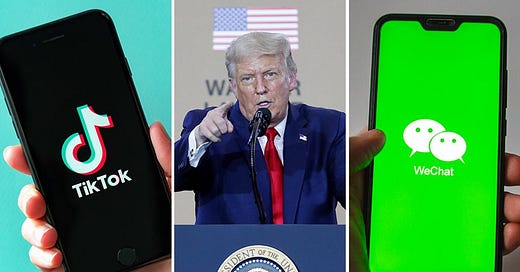Welcome to East West Hurricane! 🌪
We update you on the most essential news from Asia in tech, media, and business—the things you need to know that you probably haven’t heard in Western media.
Follow us on Twitter and Instagram! ⚡️
President Trump Escalates Chinese Bans 👀
President Trump made a new announcement yesterday affecting the use of TikTok and WeChat within the US. Trump issued an executive order giving a 45-day deadline for TikTok to be acquired by Microsoft. If a deal is not confirmed, TikTok will be banned from the US. Trump also issued a similar order for (Tencent-owned) WeChat, China’s largest messaging app that he accuses of threatening US national security. The implication is that WeChat will also need to be sold within 45 days. Tencent shares went down 5% in the aftermath of the announcement.

The TikTok news is nothing new, just another layer of official government emphasis on top of an already ongoing acquisition process. The announcement regarding WeChat comes more as a surprise. While WeChat is one of the most consequential and influential Chinese mobile apps, they have managed to hide from most US controversy and don’t even have a large number of US users. Most analysts predict that Chinese government will soon issue some kind of retaliation and the political theatre on both sides will continue.
China’s Largest Gaming Conference Resumes 🕹
ChinaJoy is China’s biggest annual gaming and digital entertainment conference, which usually features headlining companies such as Tencent, Microsoft, and Blizzard. Amidst concerns around the coronavirus, the conference organisers still decided to go ahead and physically hosted the event in Shanghai last week. Gaming and entertainment are two industries that have excelled over the last few months, so companies were still able to celebrate their recent successes at ChinaJoy. Chinese video game revenue from January to July increased 23% year-on-year.

To enter the conference, attendees needed to scan their face, national ID card, and digital health codes. Guests had to have their Alipay mobile app checked to ensure they had the “green” health codes that indicated the person had not traveled to high-risk parts of the country. Last year, 365,000 people attended ChinaJoy in person and this year, people could also attend virtually through online livestreams that ended up reaching 600 million viewers over the four-day event. ChinaJoy is an example of a huge annual conference that has been able to adapt in the world of Covid and might be a peek into the future of conferences more broadly.
Cloud Kitchens from Singapore 👩🍳
In 2019, Singaporean billionaire R. K. Kishin launched Tiffin Labs, a virtual food & beverage brand. They recently announced major plans to expand to 1,000 cloud kitchens worldwide amidst the coronavirus opportunity. Cloud kitchens are a concept where a restaurant brand has an online presence, but no physical restaurant location. Customers usually order from a virtual restaurant online and the actual food is made in a commercial kitchen. Cloud kitchen companies usually operate several restaurant brands simultaneously from the same commercial kitchen location. Each Tiffin Labs kitchen can serve eight virtual restaurants from a 16 square metre kitchen area. The company uses data to analyse customer demand and then a delivery partner like Grab, Foodpanda, or Deliveroo to bring the food to the customer.

Cloud kitchens are a trend that has accelerated because of the coronavirus. Research firm Euromonitor predicts that the global cloud kitchen market will reach $1 Trillion by 2030. Market research firm DataSpring reported that the online food delivery market in Asia has accelerated by 10 years because of the coronavirus.
Many cloud kitchen companies around the world have raised huge multi-million dollar funding rounds over the last few months and former Uber CEO Travis Kalanick’s latest venture is a cloud kitchen. Restaurant is one of the world’s most disrupted industries right now. Cloud kitchens provides a new, potentially more efficient structure that cuts out many traditional costs to bring you a delivery-only model.















Share this post